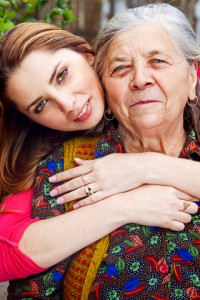Attachments are the bonds we form with people, animals, places and things. The earliest bond we form is usually with our mothers. This or a bond with another person who becomes our primary caregiver becomes the template for all other bonds we make in our lives. We can launch into life with a solid sense of ourselves if we make secure bonds of affection that give us an experience of safety and security.
If however, we have early bonds that are not secure, but are unpredictable and chaotic, or harsh and punishing this tends to make us anxious and worried about affection and safety, or perhaps make us want to avoid affection. We tend to make later relationships in the same way.
Making attachments is what we do as mammals. So when dementia comes we continue to form and need relationships with others, with animals, places and things. Familiar people assume a greater importance for providing a feeling of safety and calm. All the better if these people are affectionate and warm (if that is what gives us a feeling of being safe).
It is important to remember that some people may not have ever formed a sense of being safe because of early difficult attachments. So they may react in their dementia from the old patterns, avoiding closeness or becoming anxious and insecure about your affection.
Attachments to animals and objects also remain important for some people. It may be a favourite chair, a worn old pullover, or a photo of their old dog or even her lead.
Thomas had been sitting quietly all afternoon in the lounge. He slept for a good part of it. Watched daytime TV for a time. Without notice he got up from the chair, walked to the laundry where he grasped the dog lead off the hook and said, “Come on then”. Out the back door, and into the park that backed onto his garden. Miriam, Thomas’ wife discovered him gone from the lounge about 20 minutes later. She realised what had happened, pulled on a jacket and boots, and followed him into the park. At first she couldn’t find him but listened and eventually she heard him calling out “Chlo..ee. Chlo..ee”. “There you are” Miriam said. “I can’t find her, the rascal. She went haring off into the bushes after a rabbit and I lost sight of her.” “Never mind love. She’ll come home when she’s ready. She always does”, said Miriam. Chloe was their Jack Russell terrier who had died 15 years ago. Thomas walked her in that park every day of her life and almost every day she went after rabbits, Thomas calling her and walking home with the lead in his hand. And for the last couple of years when the memory took him. Today Miriam walked alongside him and talked gently about Chloe until they were nearly home and talking about supper.
Who and what we are attached to remains important for us well beyond the moment. For some it may be people, for others objects or even places. Former towns or homes we have lived in. People we once knew. What is significant about them is the feeling we have about those places, objects, people, and animals.
It may be that an old relationship assumes a significance for a person with dementia in the present time. This can be very disturbing for a husband or wife to find their spouse talking fondly about a former husband or wife. This has noting to do with their affection for you. It has everything to do with their inability to stay in the present and the brain’s need to find meaningful connection in whatever way it can. If they can’t retain the present moment, old memories may be more easily accessible. So the brain follows the path of least effort and finds the old flame. Disturbing perhaps but it doesn’t mean they don’t love you. They just can’t hold onto you in their minds as easily as they can the long-term memories.



 ageism in Australia. The human rights perspective has not been brought to bear on ageing much to date and this is especially true of aged care.
ageism in Australia. The human rights perspective has not been brought to bear on ageing much to date and this is especially true of aged care.